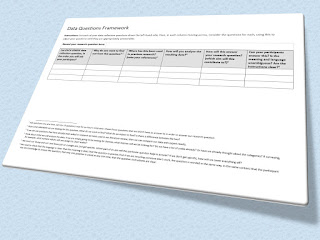As can be seen in the accompanying image, I created a Word document with 6 columns (download here). I ask supervisees to fill in as much as they can for each column when they are putting together their data collection questions, then email each draft to me so we can discuss them. We will work through several drafts, until students are comfortable that they will collect the data they need.
The columns in the framework are as follows, with clarifiers:
- List EACH SINGLE data collection question, in the order you will ask your participant. Ask questions one at a time. Aim for 15 questions max for an hour’s interview. Chose those questions that we MUST have an answer to in order to answer our research question
- Why do you want to find out from this question? Note what ANSWERS we are seeking for this question. What do we want to find? What do we expect to find? Is there a difference between the two?
- Where has this been used in previous research? If we can use questions that have already been asked in research we have used in our literature review, then we can compare our data with expert results. Bonus.
- How will you analyse the resulting data? Think about HOW we will analyse the data. If we are simply going to be looking for themes, what themes will we be looking for? Do we have a list of codes already? Or have we already thought about the categories?
- How will this answer your research question? (which aim will this contribute to?). We must not 'dump and run' and focus just on a single aim, but get specific. Which part of an aim will this particular question help to answer? If we don't get specific, how will we cover everything off?
- Can your participants answer this? Is the meaning and language unambiguous? Are the instructions clear? We need to check that the language is clear; that the meaning is clear; that the question is precise; that if we are recycling someone else’s work, the question is worded in the same way, in the same context; that the participant has the knowledge to answer the question; that only one question is asked at any one time; that the question instructions are clear.
While sometimes we might simply be able to ask particular questions under each aim and be satisfied that we have a list of questions that will answer our overarching research question, this is not always the case. This framework at least means that we really think about what we are asking our participants, and why.
And we don't waste the opportunity to collect the 'right' data :-)
Sam


No comments :
Post a Comment
Thanks for your feedback. The elves will post it shortly.